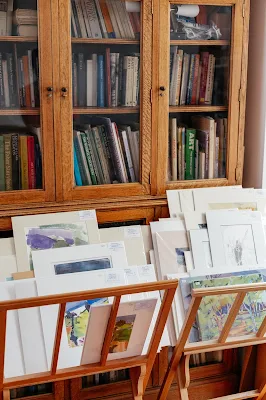Towards the end of 2017, I paid a visit to Cambridge-based artist Cathy Parker at her home and studio. I had met her a few months earlier in the same place, during Cambridge Open Studios in the summer. Aside from her studio being a dream space for painting and art-making, I was intrigued by Cathy's commitment to the subjects of nature and the landscape.
Cathy works primarily by sketching in the open landscapes of East Anglia, and often further afield, before producing semi-abstracted paintings in her studio which are based upon those sketches. As she explains, "I have two ways of working: outdoors in front of the subject, usually producing more naturalistic work; and in the studio, usually producing semi-abstracted works. Outdoors, whether I am on familiar territory or further afield, I enjoy a straight-forward approach to drawing and painting, filling sketchbooks, responding to the forms and colours of the landscape along with the changes of light and weather." In Cathy's studio are shelves of sketchbooks dating back to the early 1990s. Whilst she is obviously inspired by her local landscapes, labels on the spines of her sketchbooks reveal explorations of more exotic climes: Greece, Morocco, India, Nepal.
These quick field sketches and paintings provide an intermediary between Cathy's experience of being out in the landscape, and the paintings she will go on to make back in her studio. She says, "in a series of steps, I gradually abstract and simplify, away from the 'reality' of my original depiction, towards something else. This process may take hours, days or weeks."
Cathy says that "trees provide an endlessly stimulating subject. For one thing, they provide much- needed verticals in the very horizontal East Anglian landscape. Moreover, for me, in painting trees naturalistically, I am inevitably already simplifying and abstracting, in the sense that I do not attempt (or even want) to depict every twig and leaf."
Creating abstracted paintings based upon more realistic sketches is, for Cathy, a process of simplification. However, she says, "what is difficult is simplifying while retaining the quality that originally inspired me, the feel of the original subject, if I'm lucky something approaching the essence." As she explains, on the subject of trees, she may have been drawn by "perhaps, the bright colour of the Scots Pine bark against a blue sky, or the sense of air and wind blowing through the branches and leaves, or the energy of the tree as a growing structure supporting huge spreading leaf-laden branches."
I asked Cathy, "how did you develop such an enduring interest in nature and the landscape? Where does this stem from, and how, or why, is your interest sustained in this subject?"
Cathy replied, "I grew up in a small town in Suffolk. I grew up with artwork in the house - my great grandmother was an artist, who painted, as Mabel Parker, and made etchings under the name of M Oliver Rae, to hide the fact that she was a woman artist, which made her work more difficult to sell. I've always loved the countryside, especially the sandy heaths and the characteristic twisted Scots Pines of the Suffolk Breckland. I'm interested in wildlife, especially birds and wild flowers, and when I go out painting, I always take my walking boots and my binoculars. When I'm sitting or standing relatively still and quiet at my easel, wildlife starts to happen around me, and I see more than I might do when I'm on the move in the countryside, so painting outdoors gives me the pleasure of taking time to enjoy the countryside slowly and at length."
Cathy's words about the East Anglian landscapes she frequents remind me that there are some beautiful places in this area, and across the UK, to explore and be inspired by. Cathy says her process of painting in the studio "is endlessly challenging, the result is sometimes unpredictable and with luck can be satisfying, and it is occasionally thrilling." Perhaps the same can be said of any adventure in the great outdoors.












Write a comment